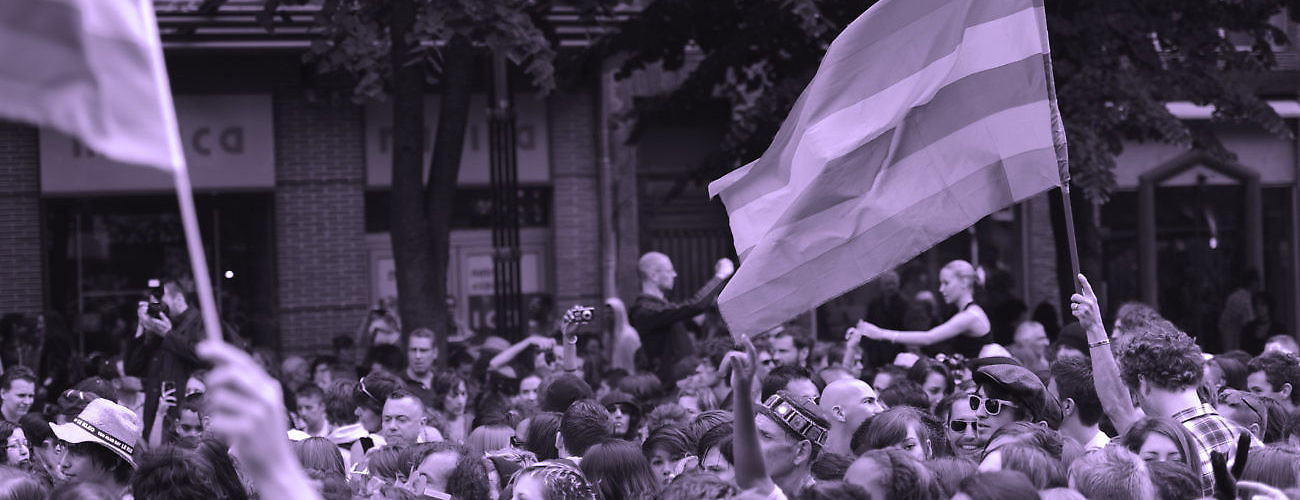Lesbian, gay, bisexual, transgender, and intersex (LGBTI) rights supporters during a parade in France. (Flickr, Guillaume Paurmier)
Fifty years ago, the Stonewall Inn riots in New York City spurred the rise of the modern gay liberation movement. Within about a decade, this movement had taken on an international dimension, and individuals and communities began to form globally-oriented non-governmental organizations (NGOs) to address issues related to sexual orientation. Over time, the scope of these organizations has expanded to include gender identity and expression and, more recently, sex characteristics—collectively referred to as SOGIESC in United Nations parlance (sexual orientation, gender identity and expression, and sex characteristics).
Yet, despite the fifty-year history of the lesbian, gay, bisexual, transgender, transsexual, Two-Spirit, queer, and intersex (LGBT2SQI) movement, these communities continue to face challenges accessing formal international fora. Framing diverse gender and sexual identities and expressions as human rights is still highly contentious in world bodies such as the UN Human Rights Council, World Health Organization, and International Court of Justice. As such, SOGIESC-focused NGOs have historically had difficulty attaining consultative status at the UN. Nonetheless, their persistent advocacy has contributed to an increased understanding and recognition of gender and sexual diversity.
My recent research reveals that although LGBTQI people have made a number of significant gains at the UN, their struggle for recognition and legitimization continues to be challenged by certain member states using three main tactics: criminalization, protection of traditional family values, and defense of state sovereignty. UN staff and special rapporteurs interviewed for this research provided numerous examples of how these tactics are deployed.
A key tactic is state-sanctioned discrimination and violence, enforced through criminal legislation. One form this takes is banning the formation of coalitions or advocacy groups that address issues related to gender, sexual diversity, and SOGIESC rights through “anti-propaganda laws” that “arbitrarily restrict the rights to freedom of expression and assembly.” Another is prohibiting NGOs from receiving overseas funding in order to discourage international network building and collaboration on SOGIESC issues. The most extreme form of criminalization is the imposition of the death penalty for those who engage in same-sex sexual relations, as is currently the law in eleven countries. This prevents SOGIESC-focused NGOs in many countries from existing in the first place, let alone being present to advocate at the UN and in other international fora.
Another tactic is to ally with the “religious right” and its “family values” campaigns. The religious right is not restricted to Christian groups (and the Vatican as a Christian state) but also includes religious groups with conservative Islamic and Jewish views. It is part of a global anti-SOGIESC movement consisting of pro-traditional family, anti-abortion, anti-feminist organizations founded and led by right-wing religious groups. The religious right has forged alliances with many member states in its fight to hinder the recognition and promotion of SOGIESC rights and therefore commands significant political power. The work of SOGIESC-focused and feminist NGOs is therefore undermined by the religious right’s presence at the UN.
Finally, some states oppose SOGIESC rights by prioritizing their national values over universal human rights—an inherent tension in UN membership. These states approach their membership in the UN from a standpoint defined by their culture, mores, values, and traditions as important aspects of their national identity. Conflicts can arise when these states prioritize such traditional values over human rights. This results in member states signing onto treaties and other internationally recognized human rights documents, including the Universal Declaration of Human Rights, yet reverting to their anti-SOGIESC perspectives when faced with human rights concerns regarding these populations.
One way the sovereignty argument is furthered is to define SOGIESC rights as a Western concept. This allows states to frame any attempt at introducing such rights as a Western imposition. At the crux of this conflict is whether such states are open to recognizing the comprehensiveness of gender and sexual diversity or whether they are committed to their own steadfast position that protects and preserves their traditions at the exclusion of some of their own citizens. Whether this is recognized or not has a direct influence on how states vote on SOGIESC matters at the UN.
Underscoring these tactics are longstanding and ongoing tensions fueled by past and present colonial and imperial projects, which have sought to prohibit expressions of gender and sexual diversity. The process of colonization involved importing and implementing policies and laws that imposed normative notions of sexuality and gender identity and expression despite preexisting diversity. Through the pressure of advocacy groups, many of these policies and laws have been repealed in the West. They have nevertheless been retained in most post-colonial countries, especially in the Commonwealth of Nations. An increasing number of SOGIESC-focused NGOs have formed and organized in these countries and are challenging these colonial and imperialistic notions at the UN and other international fora.
Understanding the tactics states engage in at the UN to resist recognizing and legitimizing NGOs who advocate for SOGIESC rights and protections can help these organizations determine ways to counter these arguments. In the face of opposition, the ongoing persistence of these NGOs is having a social, cultural, political, and legal impact on these issues, speaking to the importance of their continued contributions at the UN.
Nick J. Mulé, PhD, is an associate professor in the School of Social Work, cross appointed to the Faculty of Health and seconded to Sexuality Studies at York University in Toronto, Ontario, Canada.





